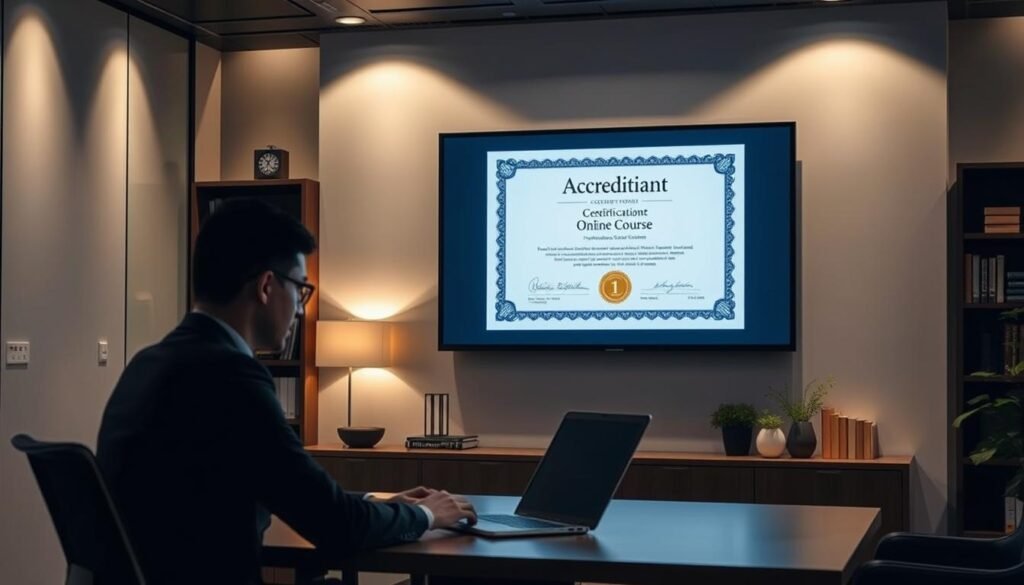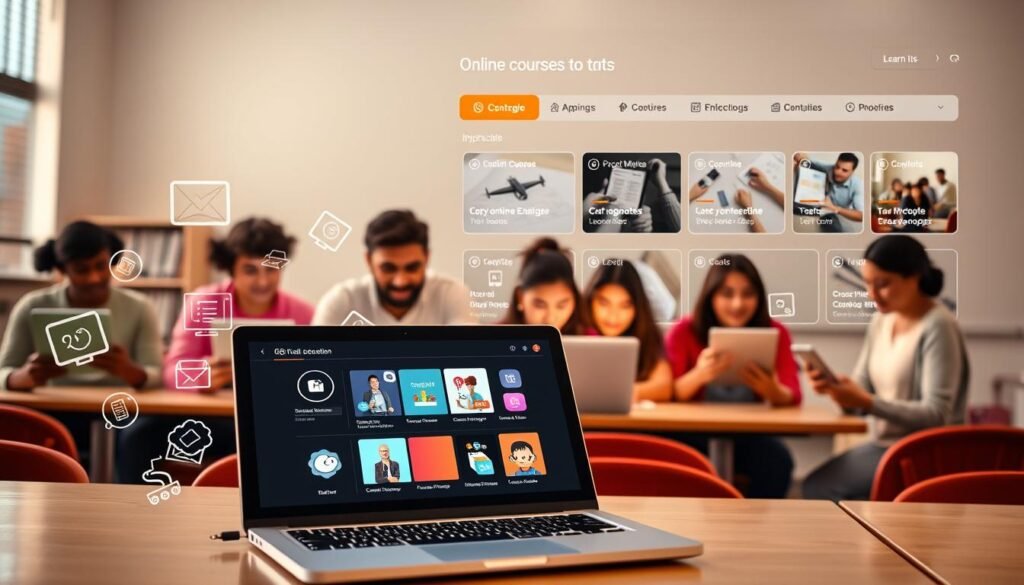Did you know that the eLearning market is projected to reach $240 billion by 2028?
This staggering growth underscores the increasing demand for digital education and online courses that can help individuals elevate their skills and advance their careers.
In today’s fast-paced world, staying ahead of the curve requires continuous learning and skill development. Engaging online courses offer a flexible and accessible way to acquire new talents, making it easier to achieve career goals.
Key Takeaways
- eLearning is a rapidly growing market.
- Digital education offers flexibility and accessibility.
- Online courses can help advance your career.
- Continuous learning is key to staying ahead.
- Engaging online courses make skill development easier.
What Are Online Courses?
Online courses offer a modern approach to education, catering to diverse needs. They provide a flexible and accessible way to build key personal development skills, such as communication, leadership, and emotional intelligence, on your own schedule.
Definition and Overview
Online courses, also known as distance learning or virtual classes, are educational programs delivered via the internet. They allow learners to access course materials, participate in discussions, and submit assignments online, eliminating the need for physical presence in a traditional classroom.
Distance learning has evolved significantly, offering a range of interactive tools and multimedia content to enhance the learning experience. This mode of education is particularly beneficial for those with busy schedules or limited access to traditional educational institutions.
Types of Online Courses
There are various types of online courses, catering to different learning needs and goals. Some popular categories include:
- Certificate courses, which provide specialized knowledge in a specific area.
- Degree programs, offering undergraduate and graduate degrees online.
- Professional development courses, designed to enhance career skills.
- Personal interest courses, allowing learners to explore new hobbies or interests.
These courses are available across a wide range of subjects, from technology and business to arts and humanities, ensuring there’s something for everyone.
Benefits of Taking Online Courses
With the rise of eLearning, individuals can now access a wide range of courses that cater to their needs and schedules. This shift has opened up new opportunities for people to learn at their own pace, whether it’s to enhance their professional skills or pursue a new hobby.
Flexibility and Convenience
One of the most significant benefits of online courses is their flexibility. Learners can access course materials at any time and from any location, allowing them to balance their studies with work, family, or other responsibilities. This convenience is particularly beneficial for those with busy schedules or those living in remote areas.
Key benefits of flexibility include:
- Learning at your own pace
- Access to course materials 24/7
- The ability to review content as many times as needed
Cost-Effectiveness
Online courses are often more cost-effective than traditional classroom-based education. They eliminate the need for commuting, and many courses are available at a lower cost due to the reduced overheads of online delivery. This makes high-quality education more accessible to a wider audience.
| Cost Factor | Traditional Education | Online Courses |
|---|---|---|
| Tuition Fees | Often higher | Generally lower |
| Commuting Costs | Applicable | Not applicable |
| Course Materials | Often additional costs | Frequently included |
Expanding Knowledge and Skills
Online courses offer a vast array of subjects and topics, allowing learners to expand their knowledge and skills in areas that interest them. Whether it’s to enhance professional qualifications or to learn a new skill, the variety of courses available means there’s something for everyone.
Popular categories include:
- Technology and programming
- Business and management
- Arts and humanities
- Health and wellness

By taking advantage of online courses, individuals can not only enhance their knowledge and skills but also improve their career prospects. The flexibility, cost-effectiveness, and range of courses available make online learning an attractive option for many.
How to Choose the Right Online Course
With numerous online courses available, identifying the right one requires a strategic approach, starting with a clear understanding of your goals. Choosing an online course is a personal decision that depends on several factors, including your learning objectives, the course content, and the provider’s credibility.
Identifying Your Goals
Before enrolling in a web-based training program, it’s essential to define what you aim to achieve. Are you looking to enhance your professional skills, transition into a new field, or pursue a hobby? Clarifying your goals will help you narrow down the options and select a course that aligns with your needs.
- Determine your learning objectives
- Assess your current skill level
- Consider the time you can dedicate to remote learning
Researching Course Providers
Once you have a clear idea of your goals, the next step is to research potential course providers. Look for institutions or platforms that offer reputable online courses. Consider factors such as the qualifications of the instructors, the course curriculum, and the level of support provided.
| Provider | Course Offerings | Instructor Expertise |
|---|---|---|
| Coursera | Varied disciplines | University-level instructors |
| Udemy | Broad range of subjects | Industry experts |
| edX | University-level courses | Professors from top universities |
Reading Reviews and Testimonials
One of the most effective ways to gauge the quality of an online course is by reading reviews and testimonials from past learners. This feedback can provide insights into the course’s strengths and weaknesses, helping you make a more informed decision.
“The online course I took not only met but exceeded my expectations. The instructors were knowledgeable, and the material was relevant and engaging.”
By following these steps, you can confidently choose an online course that meets your needs and supports your learning goals.
Top Online Course Platforms
With the rise of digital education, several top-notch online course platforms have emerged, catering to diverse learning needs and preferences.
The online learning landscape is dominated by a few key players that have established themselves through their comprehensive course offerings and user-friendly interfaces. Let’s explore some of these leading online learning platforms.
Coursera
Coursera is a prominent digital education platform that partners with top universities worldwide to offer courses on a wide range of subjects. Its specialization programs are particularly popular, allowing learners to dive deep into their areas of interest.

Udemy
Udemy is another well-known eLearning platform that hosts a vast array of courses, from technical skills to creative pursuits. Its strength lies in the diversity of its course catalog and the ability for instructors to create and sell their own courses.
edX
edX is a non-profit online learning platform that offers high-quality courses from leading institutions. It is known for its rigorous academic content and has become a go-to destination for those seeking university-level courses online.
Skillshare
Skillshare focuses on creative and practical skills, offering a variety of courses in areas such as graphic design, photography, and writing. It’s an ideal platform for those looking to enhance their creative skills or explore new hobbies.
These platforms have transformed the way we access education, making it more accessible and flexible. Whether you’re looking to advance your career or pursue a new interest, there’s an online course platform tailored to your needs.
Popular Online Course Categories
The world of online learning is vast, offering courses in a multitude of categories that cater to diverse interests and professional needs. Whether you’re looking to enhance your career prospects or pursue a new hobby, there’s an online course tailored to your goals.
Technology and Programming
With technology advancing at a rapid pace, online courses in technology and programming are in high demand. These courses cover a wide range of topics, from basic coding skills to advanced data science and artificial intelligence.
- Python programming
- Web development
- Cybersecurity
- Data analysis
Platforms like Coursera and Udemy offer a variety of courses in these areas, allowing learners to gain practical skills that are directly applicable to the job market.
Business and Management
For those interested in business and management, online courses provide insights into entrepreneurship, leadership, marketing, and more. These courses are designed to equip learners with the knowledge needed to succeed in a competitive business environment.
| Course Topic | Description | Platform |
|---|---|---|
| Digital Marketing | Learn the fundamentals of online marketing | Coursera |
| Entrepreneurship 101 | Start your own business with confidence | Udemy |
| Leadership Skills | Develop leadership qualities | edX |
Arts and Humanities
Arts and humanities courses online allow learners to explore their creative side or deepen their understanding of different cultures and historical periods. From photography to philosophy, these courses offer a rich and diverse learning experience.
- Creative writing
- Art history
- Photography techniques
- Philosophical studies
Health and Wellness
In the category of health and wellness, online courses cover topics such as nutrition, fitness, mental health, and mindfulness. These courses are ideal for individuals looking to improve their personal well-being or pursue a career in the health sector.
By exploring these popular online course categories, learners can identify areas that align with their interests and career aspirations, making the most of virtual classes and interactive online classes.
Tips for Success in Online Courses
To excel in eLearning, it’s essential to adopt effective strategies that enhance your learning experience. Online courses offer flexibility and convenience, but they also require a proactive approach to achieve success.
Setting a Schedule
One of the key factors in succeeding in online courses is setting a realistic schedule. This involves planning out your study time, setting milestones, and sticking to your plan. Effective time management is crucial in distance learning, where you may not have the structure of a traditional classroom.
To create a schedule that works for you, consider your other commitments, such as work or family obligations. Allocate specific times for studying and reviewing course materials. Consistency is key to staying on track and making the most of your online course.
Engaging with Instructors and Peers
Engagement is a vital component of online learning. Interacting with instructors and peers can enhance your understanding of the course material and provide valuable support. Discussion forums, live sessions, and group projects are excellent ways to engage with others in the course.
Don’t hesitate to reach out to your instructors if you have questions or need clarification on course content. Similarly, participating in group discussions can provide different perspectives and insights, enriching your learning experience.
Utilizing Course Resources
Online courses often come with a variety of resources, including video lectures, readings, and supplementary materials. Maximizing these resources can significantly enhance your learning.
Take the time to explore all the available materials and utilize them effectively. For example, video lectures can provide in-depth explanations, while readings can offer additional context. By leveraging these resources, you can gain a more comprehensive understanding of the course content.
| Tip | Description | Benefit |
|---|---|---|
| Set a Schedule | Plan out your study time and stick to it | Improved time management |
| Engage with Instructors and Peers | Participate in discussions and group projects | Enhanced understanding and support |
| Utilize Course Resources | Make the most of video lectures, readings, and more | Comprehensive learning experience |
The Role of Accreditation in Online Courses
In the realm of digital education, accreditation serves as a benchmark for excellence. Accreditation is a process that ensures online courses meet specific standards, making them more credible and recognized by employers and educational institutions alike.
Accreditation is crucial because it validates the quality of the course content, instructors, and overall learning experience. It signifies that the course has been reviewed and meets certain criteria, such as curriculum, faculty qualifications, and student support services.
Importance of Accreditation
The importance of accreditation cannot be overstated. It not only enhances the credibility of online courses but also ensures that students receive a high-quality education. Accredited courses are more likely to be recognized by employers, which is vital for students seeking career advancement or a career change.
“Accreditation is a key factor in ensuring that online education is of high quality and is recognized globally.”
Moreover, accreditation can impact a student’s ability to transfer credits or pursue further education. Many institutions require credits to be earned from accredited programs, making accreditation a critical factor in educational planning.
Recognized Accrediting Bodies
Several recognized accrediting bodies oversee online courses, ensuring they adhere to established standards. Some of the prominent accrediting bodies include:
- The Distance Education Accrediting Commission (DEAC)
- The Accrediting Commission of Career Schools and Colleges (ACCSC)
- The Higher Learning Commission (HLC)
| Accrediting Body | Focus Area | Recognition |
|---|---|---|
| DEAC | Distance Education | Recognized by the U.S. Department of Education |
| ACCSC | Career Schools and Colleges | Recognized by the U.S. Department of Education |
| HLC | Higher Education Institutions | Recognized by the U.S. Department of Education |
When selecting an online course, it’s essential to verify its accreditation status. This can usually be done by checking the course provider’s website or contacting the accrediting body directly.

In conclusion, accreditation is a vital aspect of online education, ensuring that courses meet high standards and are recognized by employers and educational institutions. By choosing accredited online courses, students can be confident in the quality of their education.
Online Courses vs. Traditional Education
Online learning is revolutionizing the way we acquire knowledge, but how does it stack up against traditional classroom learning? As we explore the differences between online courses and traditional education, we’ll examine the learning environments and costs associated with each.
Comparing Learning Environments
The learning environment is a crucial aspect of education. Traditional education takes place in a physical classroom, where students interact face-to-face with instructors and peers. In contrast, online courses offer a virtual learning environment, providing flexibility and accessibility. Online Learning Platforms enable students to learn from anywhere, at any time, as long as they have a stable internet connection.
While traditional education offers a structured environment, online courses require students to be self-motivated and disciplined. However, online learning allows students to review materials as many times as needed, potentially improving understanding and retention.
Cost Comparisons
One significant factor in choosing between online courses and traditional education is cost. Here’s a comparison of the costs associated with each:
| Cost Component | Traditional Education | Online Courses |
|---|---|---|
| Tuition Fees | Higher | Generally Lower |
| Textbooks and Materials | Often Physical, Can Be Expensive | Digital, Can Be More Affordable |
| Transportation | Required, Adds to Overall Cost | Not Required, Saves Money |
| Flexibility | Limited Schedule | Flexible Scheduling |
In conclusion, while both online courses and traditional education have their advantages and disadvantages, eLearning offers a flexible and potentially cost-effective alternative. As Remote Learning continues to evolve, it’s likely to play an increasingly significant role in the educational landscape.
How to Stay Motivated in Online Learning
As you embark on your online learning journey, finding ways to stay motivated is essential. Online courses, including interactive online classes and virtual classes, offer flexibility and convenience, but they also require a different kind of motivation, one that is self-driven and persistent.

Goal Setting
Setting clear and achievable goals is a fundamental step in staying motivated. By defining what you want to accomplish through your online course, you create a roadmap for your learning journey. Break down larger goals into smaller, manageable tasks to maintain a sense of progress and accomplishment.
For instance, if you’re taking an online course to improve your programming skills, your goal might be to complete a certain number of modules within a set timeframe. Regularly reviewing and adjusting your goals can help keep you on track and motivated.
Creating a Support Network
Having a support network can significantly enhance your motivation. This network can include fellow learners, instructors, or even friends and family who can provide encouragement and support. Engage with your peers through discussion forums or virtual study groups to foster a sense of community and shared purpose.
“The way to get started is to quit talking and begin doing.” – Walt Disney
Moreover, connecting with instructors can provide valuable insights and guidance. Don’t hesitate to reach out to them with questions or for feedback on your progress. By building a support network, you can stay motivated and overcome challenges that arise during your online learning journey.
Career Advancement Through Online Learning
The rise of eLearning platforms has significantly impacted how individuals acquire new skills and knowledge, directly influencing their career trajectories. Online learning offers a flexible and accessible way to enhance professional development, making it an attractive option for those looking to advance their careers.
Enhancing Resumes
One of the most significant benefits of online learning is the ability to enhance your resume with new skills and certifications. By taking courses on platforms like Coursera, Udemy, or edX, you can demonstrate to potential employers your commitment to professional development and your expertise in specific areas.
Key benefits of online courses for resume enhancement include:
- Acquiring new skills relevant to your industry
- Earning certifications that are recognized by employers
- Demonstrating a proactive approach to career development
| Platform | Course Benefits | Certification |
|---|---|---|
| Coursera | University-level courses | Yes |
| Udemy | Wide range of topics | Yes |
| edX | Verified certificates | Yes |
Networking Opportunities
Online learning platforms also provide valuable networking opportunities. By engaging with instructors and peers through discussion forums and group projects, you can build a professional network that extends beyond your local community.
Effective networking through online learning involves:
- Actively participating in course discussions
- Collaborating on group projects
- Connecting with peers on professional networking sites
By leveraging these opportunities, you can expand your professional network, gain insights into your industry, and potentially uncover new career opportunities.
Future Trends in Online Education
As technology continues to evolve, online education is likely to become even more accessible and effective. The future of online learning is expected to be shaped by several key trends that will enhance the overall learning experience.
Emerging Technologies
Emerging technologies such as Artificial Intelligence (AI), Virtual Reality (VR), and Augmented Reality (AR) are set to revolutionize the online learning landscape. These technologies will enable more interactive and immersive learning experiences, making online courses even more engaging.
- AI-powered adaptive learning: AI can personalize the learning experience by adjusting the difficulty level of course materials based on individual student performance.
- VR and AR: These technologies can create immersive environments that simulate real-world situations, making complex concepts easier to understand.
Increased Accessibility
Increased accessibility is another significant trend in online education. With the proliferation of mobile devices and improvements in internet connectivity, more people will have access to online courses, making remote learning a viable option for a broader audience.
- Mobile Learning: The rise of mobile devices has made it possible for students to access online courses from anywhere, at any time.
- Internet Connectivity: Improvements in internet connectivity, including the expansion of 5G networks, will further enhance the online learning experience by providing faster and more reliable access to course materials.
The future of online education looks promising, with emerging technologies and increased accessibility set to play key roles. As online courses continue to evolve, they will become an even more integral part of the educational landscape.
Conclusion: Start Your Learning Journey Today!
With the vast array of online courses available, you can now embark on your educational journey at any time, advancing your skills and career prospects. The flexibility and convenience of eLearning make it an ideal choice for those seeking to enhance their knowledge in Digital Education.
By choosing the right Online Course, you can gain the skills needed to stay competitive in the job market. Whether you’re interested in technology, business, or the arts, there’s an online course tailored to your needs. Take the first step towards achieving your goals and explore the world of eLearning today.
Start your Digital Education journey now and unlock new opportunities for personal and professional growth. With the knowledge and skills gained from Online Courses, you can take your career to the next level and achieve success.
FAQ
What are the benefits of taking online courses?
How do I choose the right online course?
What are the most popular online course categories?
How can I stay motivated in online learning?
What is the role of accreditation in online courses?
How do online courses compare to traditional education?
Can online learning contribute to career advancement?
What are the future trends in online education?
Are online courses suitable for all learning styles?
How can I ensure success in online courses?
🌐 Explore the Smart Digital Network
A connected ecosystem of innovative platforms — empowering your journey through Smart Living, AI Automation, Wellness, Reviews, and Digital Learning. Discover more from our network below 👇
Part of the Smart Digital Network © 2025 — Explore, Learn & Grow Smarter 💡
Prabir Dutta
Prabir Dutta is a passionate digital creator, affiliate marketer, and wellness enthusiast who simplifies complex topics like AI tools, Vastu, pet care, and modern living. With a keen eye for SEO, tech trends, and everyday health solutions, he writes to empower readers with actionable, smart-living insights. When not curating content across his network of niche blogs, Prabir enjoys exploring new digital tools that make life easier and more efficient.
















